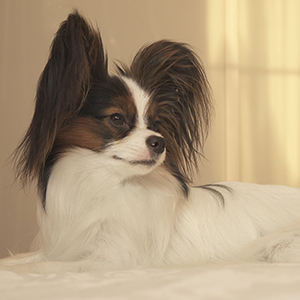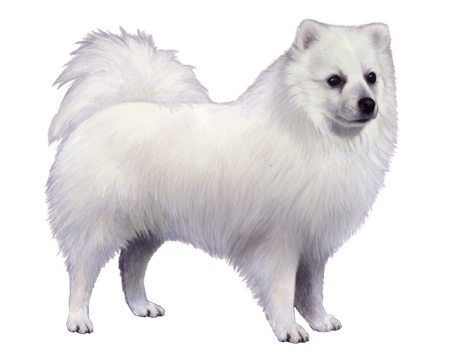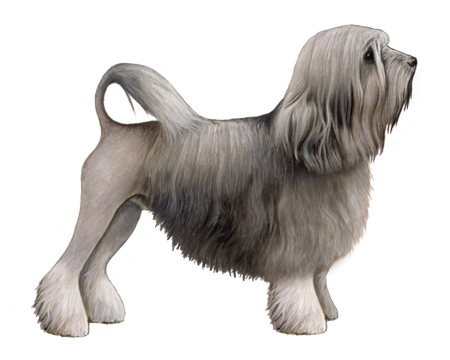
Continental Toy Spaniel
The Continental Toy Spaniel is friendly, curious, and intelligent. Despite its small size, this toy breed makes an excellent watchdog, alerting its owners at the first signs of trouble.
Interested in discovering if your dog is a Continental Toy Spaniel?
Check out Wisdom Panel's DNA tests.

Continental Toy Spaniel Traits
General Appearance
The Continental Toy Spaniel has long hair, a proud carriage, and an easy, elegant gait.
Coat and Coloring
Continental Toy Spaniels have abundant glossy, wavy (not curly) hair with a fine texture. The hair is short on the face, muzzle, and front of the legs. The hair on the body is medium length, but longer on the neck, forming a frill that descends to the chest. The ears and backs of the legs are fringed. Their coats are white with patches of any color on their bodies.
Distinctive Physical Traits
Continental Toy Spaniels are fine-boned dogs that are slightly longer than tall. They have fine, thin muzzles, large, dark-colored, almond-shaped eyes, and alert expressions.
The ears are the main difference between the Continental Toy Spaniel and Papillon. Continental Toy Spaniels have Phalene or drop-type ears that are set considerably higher than the eye line and carried hanging. Papillons have large, erect ears with rounded tips. They are set on the side of the head, toward the back, and move like butterfly wings.
The American Kennel Club considers Continental Toy Spaniels and Papillons the same breed. International registries, including those in Europe, classify them as separate breeds.
Continental Toy Spaniel Temperament
Continental Toy Spaniels are happy, alert, and friendly. These dogs were bred for companionship and want to spend time with their people above all else. Left alone for too long, Continental Toy Spaniels may develop undesirable behaviors.
The Continental Toy Spaniel is an excellent breed for families, including children. They may be shy around strangers and require socialization to reduce any defensive or aggressive tendencies.
True to the small dog stereotype, Continental Toy Spaniels can be yappy. They have a lot to say! However, these big barkers might disturb close-by neighbors, so apartment living might not be for them. Training could help reduce their urge to be vocal.


Continental Toy Spaniel History
There is some debate surrounding the origins of the Continental Toy Spaniel. Most agree that Spaniels were imported from China to Europe before being bartered on trading routes across the Mediterranean. The emergence of toy breeds such as the Continental Toy Spaniel is less clear, though a trail of evidence does exist.
Italian art from the 1500s depicts red and white toy spaniels. Louis XIV owned black and white toy spaniels. And King Charles I and King Charles II owned black and tan spaniels (later renamed King Charles Spaniels). The transition of power from a Catholic monarchy who owned toy spaniels to a Protestant that preferred Pugs almost led to the extinction of the breed in England.
When toy spaniels began making a comeback, potential crossbreeding with the Japanese Chin led to dogs with a much different appearance than earlier toy spaniels. These dogs were, perhaps, the beginning of the modern Continental Toy Spaniel. But there's another twist to the breed's story. The Papillon—a descendant of the Continental Toy Spaniel popularized in Belgium and France—is often considered the same breed, distinguished only by the shape of its ears.
Continental Toy Spaniel Care
Nutrition
Feed Continental Toy Spaniels a high-quality dog food that's appropriate for their age and breed size. To prevent them from becoming overweight, keep an eye on their food intake. Portion out their meals with a measuring cup to avoid over-feeding and limit treats to no more than 10% of their daily calories.
Grooming
Continental Toy Spaniels require weekly brushing. Pay particular attention to the longer hair on their legs, buttocks, and behind their ears to keep it from matting. This breed has fast-growing nails that need regular trimming.
All dogs need dental care. Start a regular dental care routine when they're young. Brushing their teeth and scheduling professional cleanings ensures good oral hygiene throughout their lives.
Exercise
Continental Toy Spaniels are a moderately active breed. They enjoy going for walks and playing in a fenced yard—especially because it means spending quality time with their families.
Provide opportunities for mental and physical stimulation—such as games and puzzle toys—to keep this intelligent breed engaged and active. Continental Toy Spaniels also enjoy competitive obedience and agility, and consistently rank among the top breeds in these sports.
Training
This intelligent and eager-to-please breed is easy to train. A consistent training program that incorporates positive reinforcement and rewards can provide the right foundation to teach them basic commands and new tricks.
Like other small breeds, it may take extra time for Continental Toy Spaniels to master housetraining. Consistency is key.
Regular socialization is also important to make these pups feel comfortable with unfamiliar people, pets, and places.

Continental Toy Spaniel Genetic Health Conditions
-
Chondrodystrophy (CDDY) and Intervertebral Disc Disease (IVDD) Risk
Chondrodystrophy (CDDY) is a skeletal disorder characterized by shortened limbs and abnormal early degeneration of the spinal discs, or intervertebral disc disease (IVDD), which predisposes to disc herniation.
-
Neuroaxonal Dystrophy (Discovered in the Papillon)
Neuroaxonal dystrophy (NAD) comprises a group of rare neurodegenerative disorders. NAD in the Papillon is characterized by an abnormal gait, blindness, tremors, and collapse.
-
Progressive Retinal Atrophy (Discovered in the Papillon and Phalène)
Progressive Retinal Atrophy (PRA) is a disorder that causes the degeneration of the light sensing retina at the back of the eye, resulting in vision loss.
-
von Willebrand's Disease, type 1
von Willebrand's Disease (vWD) Type 1 is a blood clotting disorder that typically causes mild bleeding tendencies although some affected dogs may have more severe signs. It is the result of low levels of von Willebrand's factor, a blood protein that helps stabilize blood clots.
Knowing if your Continental Toy Spaniel is a carrier or at-risk for these conditions can help you and your veterinarian plan for your pup’s lifelong care. With Wisdom Panel™ Premium, you can get results for over 200 genetic health tests.
Breed Group
Companion
This group consists of dogs typically bred for the specific purpose of human companionship, and many are popular pets because of their gentle nature. They became more common as the concept and luxury of dogs as pets prevailed.



























_Color.png)










